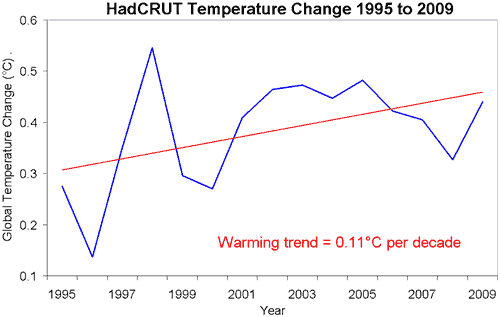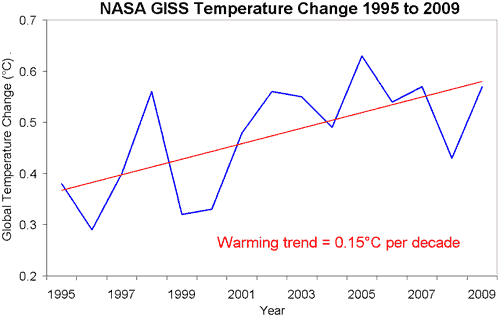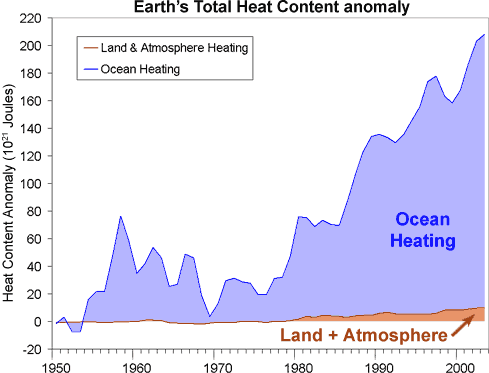Phil Jones and the meaning of 'statistically significant warming'
What the science says...
Climate Myth...
Phil Jones says no global warming since 1995
'Phil Jones said that for the past 15 years there has been no "statistically significant" warming. The admissions will be seized on by sceptics as fresh evidence that there are serious flaws at the heart of the science of climate change and the orthodoxy that recent rises in temperature are largely man-made.' (Daily Mail)
A headline in the Daily Mail claims that Phil Jones, ex-director of the University of East Anglia’s Climatic Research Unit, said 'there has been no global warming since 1995'. Not only did Phil Jones not say these words, this interpretation shows a poor understanding of the scientific concepts behind his words. To fully understand what Phil Jones was saying, one needs to read his actual words and understand the science discussed. Here is the relevant excerpt from the BBC interview:
BBC: Do you agree that from 1995 to the present there has been no statistically-significant global warming
Phil Jones: Yes, but only just. I also calculated the trend for the period 1995 to 2009. This trend (0.12C per decade) is positive, but not significant at the 95% significance level. The positive trend is quite close to the significance level. Achieving statistical significance in scientific terms is much more likely for longer periods, and much less likely for shorter periods.
BBC: How confident are you that warming has taken place and that humans are mainly responsible?
Phil Jones: I'm 100% confident that the climate has warmed. As to the second question, I would go along with IPCC Chapter 9 - there's evidence that most of the warming since the 1950s is due to human activity.
Phil Jones is saying there is a warming trend but it's not statistically significant. He's not talking about whether warming is actually happening. He's discussing our ability to detect that warming trend in a noisy signal over a short period. To demonstrate this, look at the HadCRUT temperature record from 1995 to 2009. The linear trend is that of warming. However, the temperature record is very noisy with lots of short term variability. The noisy signal means that over a short period, the uncertainty of the warming trend is almost as large as the actual trend. Hence it's considered statistically insignificant. Over longer time periods, the uncertainty is less and the trend is more statistically significant.

Figure 1: HadCRUT global temperature change in degrees Celsius. Blue is yearly average. Red is linear trend (HadCRUT).
It bears remembering that the HadCRUT record only covers around 80% of the globe. Analysis by European Centre for Medium-Range Weather Forecasts (ECMWF) and NASA GISS (Hansen 2006) find that the areas omitted by HadCRUT are some of the fastest warming regions in the world. Consequently, the HadCRUT record underestimates the warming trend, as demonstrated by the NASA GISS record which covers the whole globe:

Figure 2: NASA GISS Global temperature change in degrees Celsius. Blue is yearly average. Red is linear trend (NASA GISS).
However, even this doesn't give you the full picture. Surface temperature is only a small fraction of our climate with most of global warming going into the oceans. When all the heat accumulating in the oceans, warming the land and atmosphere and melting ice is tallied up, we see that global warming is still happening.

Figure 3: Change in total Earth heat content from 1950 (Murphy 2009).
Last updated on 26 June 2010 by John Cook.































 Arguments
Arguments































I participate in YA global warming forum and the deniers there always drop "statistically significant" but he went on to say the average warming for the period I think was 0.2C yearly which is a slight warning
Just another case of cherrypicking
YahooMike @12, 0.2 C per year is a very large rate of warming. In fact it is 10 times the underlying (ignoring volcanic influences) predicted rate from the IPCC, which is approximately 0.2 C per decade. You may have misremembered the rate of warming the denier in question claimed.
"When all the heat accumulating in the oceans, warming the land and atmosphere and melting ice is tallied up, we see that global warming is still happening."
Naturally this article fails to mention that since the hydrosphere is 271 times as massive as the atmosphere, if oceans are absorbing the heat they are likely to moderate AGW into a nonproblem, as the average ocean temperature has only changed by .1 degrees in 50 years, an amount that is probably smaller than measurement error.
[PS] please note the comments policy, especially the section on sloganeering. There are numerous papers on measurement error and you wish to dispute that please provide evidence to support it. That the oceans ameliorate warming hardly needs stating - without oceans, we would have warming by 36C. If you wish to propose that somehow heat uptake can increase to make it a "non-problem", then provide evidence to back it. The evidence from papers in the IPCC reports do not appear to support your argument. Further speculative sloganeering without support will be deleted.